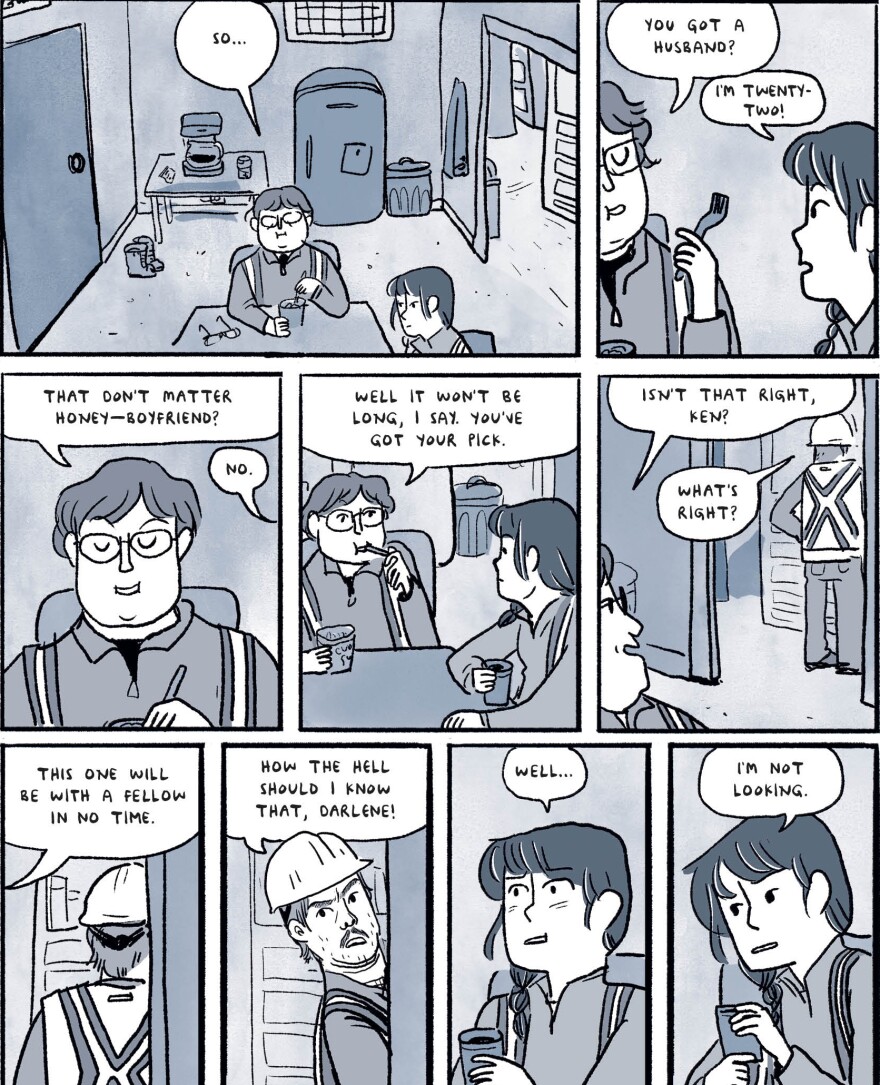Buried in the center of Kate Beaton's massive graphic memoir Ducks: Two Years in the Oil Sands is a terse, yet surprisingly apt, thesis statement.
Fittingly, considering that this is a book about exploitation, Beaton borrows it from the Somali cab driver who gives her a lift to a job site. When he learns that Beaton will be an on-site dweller mixing with day workers, he says, "You be careful, young girl. You live here, they don't. Do you know how people treat a place where they don't live?"
That's a fair summation of the intertwined themes running through Ducks. The driver makes a neat parallel between the way OPTI Canada, CNOOC Petroleum, Syncrude and other companies are treating the land of Alberta and the danger Beaton runs into as an unattached young woman attempting to work in an overwhelmingly male environment. The fact that Beaton herself is participating in the oil companies' depredations gives the driver's statement an ironical twist, as does his ignorance of the treatment that Beaton has already endured.
Beaton is best known for her quirky historical comic series Hark! A Vagrant, which became two bestselling books, as well as the equally lighthearted King Baby and The Princess and the Pony. It may come as a shock to find that there's so much darkness lurking within the mind that gave us those perky revolutionaries, feisty peasants and a roly-poly Napoleon. It's only now that Beaton has seen fit to tell the other side of her life story: how terribly she suffered during the two years she worked in Alberta's oil fields. She pulled 12-hour shifts in an environment that, as she draws it, is little better than a hellscape. But those struggles were nothing compared to what was inflicted on her by her fellow workers simply because she happened to be one of the very few women around. In Ducks, she's routinely sexually harassed in every possible manner, and when she reports the problem to her supervisor she's rebuked with a series of sexist platitudes: "We work as a team here. And listen, you knew this was a man's world when you came, it's not always nice. ... You're going to have to get a thicker skin. I can't be giving anyone special treatment." It's no wonder, then, that Beaton feels she has nowhere to turn when she's raped by two different men on different occasions.
Beaton went to Alberta for the same reason that countless others did: To take advantage of the oil rush there and snag a low-skill, high-paying job. She may have been unique among the local workforce in her ultimate goal, though. She saw few other ways to pay off the crushing student loans she'd amassed while getting an arts degree in college.

The ordeal she goes through in order to pay her debt is like something out of a heroic fable, or an opera. As she draws it, life in the oil sands is no picnic for the male workers, what with the long shifts, bleak surroundings, constant risk of injury and possibility of long-term illness. But for women it's another story entirely. The fact that many of the men Beaton meets are perfectly nice almost makes it worse; she's constantly trying to figure out whom she can trust. "I try to remember that there are a lot of men who just never speak to me, or never bother me," she reflects. "I don't even remember them because they are never in my face." But almost anytime Beaton starts to trust a man, she finds she's made a mistake. She likens herself to the occasional wildlife that come near the camp, such as a three-legged fox and the hundreds of migrating ducks, drowned in a tailings pond, who give the book its name. "Danger," reads a sign Beaton reproduces satirically on its own page. "Wildlife in Area."
Still, Beaton is unable to resist the lure of all that money — enough to pay off her loans in just two years. She even gets her sister a job there. She's not sure what to say or think when she sees news reports of Greenpeace activists attacking a site or a YouTube video of a Cree woman describing how the oil companies have hurt her tribe. Beaton knows she's culpable, but she's not sure what to say.
Ducks isn't drawn as engagingly as Hark! A Vagrant. That's understandable considering it's a journalistic undertaking, not a high-spirited, episodic strip. It's surprising to learn that it was during this period that Beaton began drawing and publishing Hark! It may be time to revisit the strip — is there a dark underbelly there? One thing's for sure, we can't take Beaton's unique humor for granted anymore.
Etelka Lehoczky has written about books for The Atlantic, The Los Angeles Review of Books and The New York Times. She tweets at @EtelkaL.
Copyright 2022 NPR. To see more, visit https://www.npr.org.




